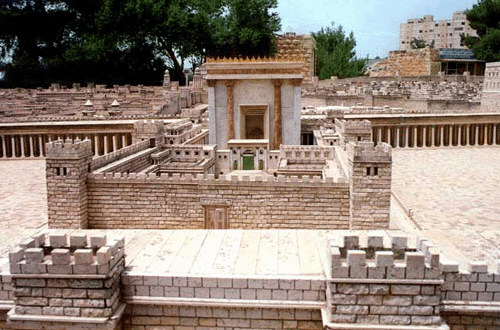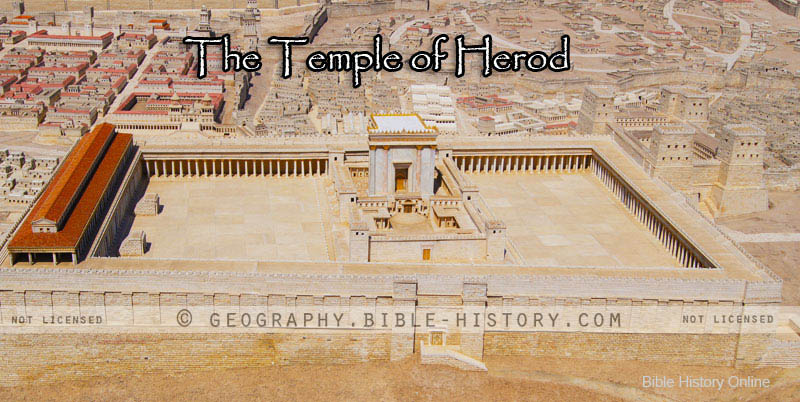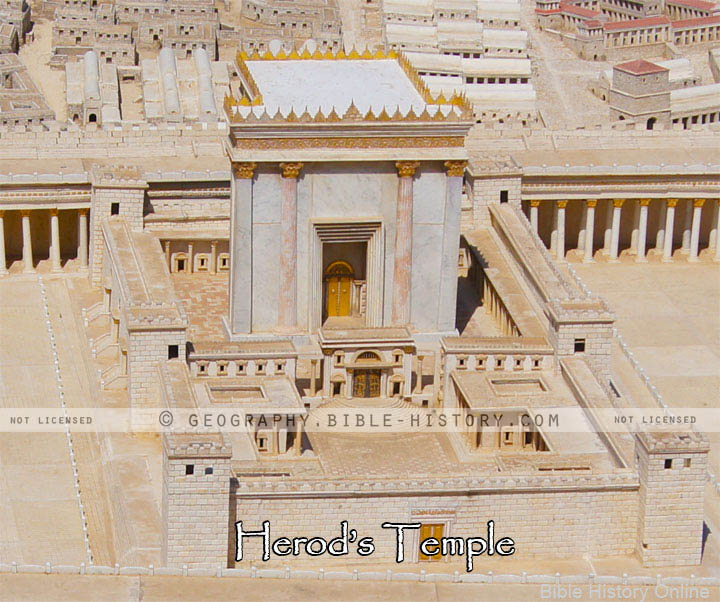The Jerusalem Temple - First Century Jerusalem

The Entrance to the
Temple - Second Temple Model of Jerusalem in the Israel Museum
![]()

The Temple in Jerusalem
Herod's
finest achievement, the Temple in Jerusalem.
"One of His disciples said to Him, 'Look, Teacher what wonderful stones and what wonderful buildings." (Mk 13:1)
When Herod the Great rebuilt Jerusalem's Temple in 19 BC, he erected a great retaining wall to extend the Temple's base. Taking thousands of workers many years to build, the huge wall was made of limestone blocks (some of them over 30 feet long and 25 feet thick) hauled from a quarry on rollers and hoisted aloft by wooden cranes.
The Construction of the Temple
None of the restorations or extensions of the Second Temple of Zerubbabel could compare with the work begun by King Herod I (the Great) at the beginning of 19 BC. Herod complained that the Temple of Zerubbabel was built like a fortress and was shorter than that of Solomon�s Temple by about 90 feet because of a decree made by Darius, the Persian king. King Herod no doubt wanted to be remembered forever as the builder of the greatest temple of the Jews.
Although the reconstruction was equal to an entire rebuilding, still the Herodian Temple cannot be spoken of as a third Temple, for Herod even said himself, that it was only intended to be regarded as an enlarging and further beautifying of that of Zerubbabel�s.The work of rebuilding the Temple began in 19 BC which was the 18th year of King Herod�s reign. There were 10,000 skilled laborers and according to Josephus (Ant. 15.11.2) the laity could not enter certain parts of the building, therefore 1000 Levites were specially trained as builders and masons, and carried out their work so efficiently and carefully that at no time was there any interruption in the sacrifices and other services. The work was started by leveling larger portions of the Temple Mount, so that the new building might be erected on a broader base. It was also made much taller, so that the white stone gleamed in the bright Palestinian sun and could be seen from miles away.
Wealthy Jews of the dispersion (those living outside Palestine) sent costly offerings to enhance the magnificence of the place.The construction began with the Holiest building in the Temple called The Holy Place, which contained the Holy of Holies. Then closest to the Holy Place was the portion set aside for the altar of burnt offering and the officiating priests. Next to it was the court for the Israelites who came to watch the service. By the side of that was the court of the women, and behind it was the court of the Gentiles with the royal porticos of Solomon. All around the Temple Mount beautiful marble porticos were constructed.
A wall surrounded the whole area and a small portion of it remains to this day, known as "The Wailing Wall."Two large bridges connected the Temple with the city on the west.
While the main part of Herods rebuilding was completed before his death in 4 BC, the work went on for more than 60 years after that. When Jesus visited the Temple at the first Passover of his ministry it was said that the place had by then been under construction for 46 years. The work was not entirely finished until 63 AD, only 7 years before the destruction of the entire Temple in 70 AD.The following words appear on the website of the Israeli Ministry of Foreign Affairs:
"From the times of King Solomon to the return from the Babylonian exile and the Hasmonean period (tenth to first centuries BCE), the Temple Mount in Jerusalem was a relatively small platform built on top of Mount Moriah and its highest point was the Stone of Foundation; this was the site of the Temple. King Herod's greatest building project was to double the area of the Temple Mount by incorporating part of the hill to the northwest (which had to be leveled and on which he built the Antonia Fortress) and by filling up parts of the surrounding valleys. Herod transformed the Second Temple into an edifice of splendor and surrounded the Temple Mount on its four sides with massive retaining walls. The walls, founded on bedrock, were built of large ashlar stones with beautifully dressed margins. Each course was set back about 2 - 3 cm. from the course below it; the stones weigh some five tons each, the corner blocks tens of tons....."

Model of the Temple in Jerusalem at Israel Museum Campus
Temple Compound

Close up of the Entrance to the Temple - Second Temple Period Model in Israel
Museum
See: Herod's Temple
![]()
Read The Bible
- 1599 Geneva Bible (GNV)
- 21st Century King James Version (KJ21)
- American Standard Version (ASV)
- Amplified Bible (AMP)
- Amplified Bible, Classic Edition (AMPC)
- Authorized (King James) Version (AKJV)
- BRG Bible (BRG)
- Christian Standard Bible (CSB)
- Common English Bible (CEB)
- Complete Jewish Bible (CJB)
- Contemporary English Version (CEV)
- Darby Translation (DARBY)
- Disciples’ Literal New Testament (DLNT)
- Douay-Rheims 1899 American Edition (DRA)
- Easy-to-Read Version (ERV)
- English Standard Version (ESV)
- English Standard Version Anglicised (ESVUK)
- Evangelical Heritage Version (EHV)
- Expanded Bible (EXB)
- GOD’S WORD Translation (GW)
- Good News Translation (GNT)
- Holman Christian Standard Bible (HCSB)
- International Children’s Bible (ICB)
- International Standard Version (ISV)
- J.B. Phillips New Testament (PHILLIPS)
- Jubilee Bible 2000 (JUB)
- King James Version (KJV)
- Lexham English Bible (LEB)
- Living Bible (TLB)
- Modern English Version (MEV)
- Mounce Reverse Interlinear New Testament (MOUNCE)
- Names of God Bible (NOG)
- New American Bible (Revised Edition) (NABRE)
- New American Standard Bible (NASB)
- New American Standard Bible 1995 (NASB1995)
- New Catholic Bible (NCB)
- New Century Version (NCV)
- New English Translation (NET)
- New International Reader's Version (NIRV)
- New International Version - UK (NIVUK)
- New International Version (NIV)
- New King James Version (NKJV)
- New Life Version (NLV)
- New Living Translation (NLT)
- New Matthew Bible (NMB)
- New Revised Standard Version (NRSV)
- New Revised Standard Version Catholic Edition (NRSVCE)
- New Revised Standard Version, Anglicised (NRSVA)
- New Revised Standard Version, Anglicised Catholic Edition (NRSVACE)
- New Testament for Everyone (NTE)
- Orthodox Jewish Bible (OJB)
- Revised Geneva Translation (RGT)
- Revised Standard Version (RSV)
- Revised Standard Version Catholic Edition (RSVCE)
- The Message (MSG)
- The Voice (VOICE)
- Tree of Life Version (TLV)
- World English Bible (WEB)
- Worldwide English (New Testament) (WE)
- Wycliffe Bible (WYC)
- Young's Literal Translation (YLT)
Table of Contents
Main Menu
- Ancient Assyrian Social Structure
- Ancient Babylonia
- Ancient Canaan During the Time of Joshua
- Ancient History Timeline
- Ancient Oil Lamps
- Antonia Fortress
- Archaeology of Ancient Assyria
- Assyria and Bible Prophecy
- Augustus Caesar
- Background Bible Study
- Bible
- Biblical Geography
- Fallen Empires - Archaeological Discoveries and the Bible
- First Century Jerusalem
- Glossary of Latin Words
- Herod Agrippa I
- Herod Antipas
- Herod the Great
- Herod's Temple
- High Priest's in New Testament Times
- Jewish Literature in New Testament Times
- Library collection
- Map of David's Kingdom
- Map of the Divided Kingdom - Israel and Judah
- Map of the Ministry of Jesus
- Matthew Henry Bible Commentary
- Messianic Prophecy
- Nero Caesar Emperor
- Online Bible Maps
- Paul's First Missionary Journey
- Paul's Second Missionary Journey
- Paul's Third Missionary Journey
- Pontius Pilate
- Questions About the Ancient World
- Tabernacle of Ancient Israel
- Tax Collectors in New Testament Times
- The Babylonian Captivity
- The Black Obelisk of Shalmaneser
- The Books of the New Testament
- The Court of the Gentiles
- The Court of the Women in the Temple
- The Destruction of Israel
- The Fall of Judah with Map
- The History Of Rome
- The Incredible Bible
- The Jewish Calendar in Ancient Hebrew History
- The Life of Jesus in Chronological Order
- The Life of Jesus in Harmony
- The Names of God
- The New Testament
- The Old Testament
- The Passion of the Christ
- The Pharisees
- The Sacred Year of Israel in New Testament Times
- The Samaritans
- The Scribes
Ancient Questions
- Why Do the Huldah Gates Appear Different in Ancient Replicas and Modern Photos?
- What Is the Origin of the Japanese and Chinese Peoples? A Biblical Perspective
- How did the ancient Greeks and Romans practice medicine and treat illnesses?
- What were the major contributions of ancient Babylon to mathematics and astronomy?
- How did the ancient Persians create and administer their vast empire?
- What were the cultural and artistic achievements of ancient India, particularly during the Gupta Empire?
- How did ancient civilizations like the Incas and Aztecs build their remarkable cities and structures?
- What were the major trade routes and trading practices of the ancient world?
- What was the role of slavery in ancient societies like Rome and Greece?
- How did the ancient Mayans develop their sophisticated calendar system?
Bible Study Questions
- Why Do Christians Celebrate Christmas?
- How Many Chapters Are There in the Bible?
- The Five Key Visions in the New Testament
- The 400-Year Prophecy: Unpacking Genesis 15 and the Journey of a People
- The Authorized (King James) Version (AKJV): Historical Significance, Translation Methodology, and Lasting Impact
- Exploring the English Standard Version (ESV): Its Aspects, Comparisons, Impact on Biblical Studies, and Church Use
- A Detailed Historical Analysis of Language Updates in the KJ21: Comparison with Other Versions
- A Detailed Historical Analysis of the American Standard Version (ASV): Comparison to the King James Version, Influence on Later Translations, and Evaluation of Strengths and Weaknesses
- A Detailed Historical Analysis of Amplifications in the Amplified Bible (AMP) and Its Comparison to Other Bible Translations
- Detailed Historical Analysis of the Amplified Bible Classic Edition (AMPC): Examples of Amplifications and Comparative Analysis with Other Bible Translations
About
Welcome to Free Bible: Unearthing the Past, Illuminating the Present! Step into a world where ancient history and biblical narratives intertwine, inviting you to explore the rich tapestry of human civilization.
Discover the captivating stories of forgotten empires, delve into the customs and cultures of our ancestors, and witness the remarkable findings unearthed by dedicated archaeologists.
Immerse yourself in a treasure trove of knowledge, where the past comes alive and illuminates our understanding of the present.
Join us on this extraordinary journey through time, where curiosity is rewarded and ancient mysteries await your exploration.
Recent posts
-

Guest Posting in SEO: A Practical Marketer’s Guide to Links, Authority, and Safer Publishing
Guest posting can still be a smart way to build visibility, relationships, and referral traffic—but only when it’s done with real editorial value ... -

Religion in the U.S.: Where Belief Is Quietly Changing
Religion in the United States is not disappearing, but it is gradually reshaping itself in ways that are easy to overlook. Public debates often focus ... -

Best Free Microsoft Office Alternatives in 2026
Microsoft Office is the standard of productivity but not all can afford its subscription model. Luckily, there are free alternatives that will provide... -

João Cotrim de Figueiredo: A Journey from Business Leader to Presidential Hope for a Modern Portugal
João Cotrim de Figueiredo (full name: João Fernando Cotrim de Figueiredo), born on June 24, 1961, in Lisbon, Portugal, is a prominent Portuguese bus... -

Modern Christian Abstract Art Canvas Prints | Artesty
Modern Christian Abstract Art: Contemporary Spiritual Wall Art for a Modern Home Modern Christian art makes it easier to bring faith into everyday spa...